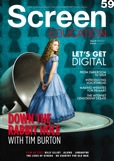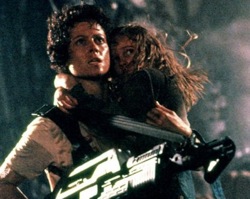
James Cameron’s 1986 film Aliens contains a fascinating exploration of the way Western culture has traditionally aligned feminine characteristics onto nature while masculine characteristics have been aligned with civilisation. However, far from the more clear cut representation of this dichotomy that Cameron would later explore in Avatar (2009), where feminine/nature equalled good and masculine/civilisation equalled bad, Aliens has a more complex exploration by presenting two extremes of femininity with masculinity caught in the crossfire in the middle. With the alien queen as the monstrous version of motherhood facing off against Ellen Ripley (Sigourney Weaver) as the nurturing version of motherhood, the hyper masculine marines are at best rendered ineffective and at worst killed or used as incubators.[i] A further complexity is added by having the ruthless corporate interests at play in Aliens to be more reflexive of the parasitic aliens than the values of most of the human characters.
Exploitative commercialism
Commercialism features heavily throughout Aliens creating a very cynical depiction of humanity in the future still being obsessed with making money despite the great technological advances we have made as a species. This theme began in Ridley Scott’s 1979 horror/science-fiction film Alien, which Aliens is a sequel to, with the crew constantly bickering about their bonuses. It was then revealed that the company they reported to (not directly named as the Weyland-Yutani Corporation until Aliens) had an economic interest in the deadly alien, wanting to get it back to Earth, and considered the crew expendable.
The focus on economic gain over human life is introduced in Aliens during the very first line of dialogue when the salvage crew worker expresses his disappointment over the fact that because Ripley is alive they cannot claim her shuttle for themselves. Later when a panel of executives from Weyland-Yutani are questioning Ripley, they seem more concerned about the loss of the mining ship the Nostromo than taking what Ripley is saying seriously. There is also an early scene depicting the LV-426 colonists debating the claim rights to what they’ve been sent to investigate.
The concern over losing infrastructure and resources over preventing potential harm to humans is later expressed when Carter Burke (Paul Reiser) speaks out against the idea of destroying the LV-426 colony (and the aliens who now infest it that he describes as an ‘important species’) because of the investments his company has made. The true extent of Burke’s cold-hearted economic opportunism comes to light later when it is revealed that he intentionally ordered the colonists to investigate the derelict spaceship and when he deliberately exposes Ripley and Rebecca ‘Newt’ Jorden (Carrie Henn) to two of the impregnating spider-like ‘facehugger’ creatures in the hope that he can then smuggle the alien embryos back to Earth for the company’s biological weapons division.
Two types of parasites
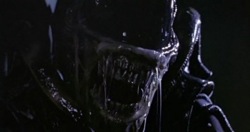 Ripley may say that at least the aliens do not try to short-change each other for a percentage but the symbolic dichotomy of the company/alien allegiance versus humanity is set up in the original Alien film. The alien is the ‘perfect organism’ with its capacity to kill, acid blood defensive mechanism and parasitic reproductive system putting it at the top of the evolutionary food chain. The company is so purely focused on generating profit that it is similarly ruthless in its disregard for human life. Both the alien and the company exist to survive and continually grow.
Ripley may say that at least the aliens do not try to short-change each other for a percentage but the symbolic dichotomy of the company/alien allegiance versus humanity is set up in the original Alien film. The alien is the ‘perfect organism’ with its capacity to kill, acid blood defensive mechanism and parasitic reproductive system putting it at the top of the evolutionary food chain. The company is so purely focused on generating profit that it is similarly ruthless in its disregard for human life. Both the alien and the company exist to survive and continually grow.
In Aliens the primordial nightmare of the natural world that is the aliens is further emphasised but this time its human foe, specifically Ripley as the only survivor from the original film, is also aligned strongly with the natural world. Therefore, the opposing forces in Aliens are the brutal survival-of-the-fittest version of nature, reflected by both the aliens and the Weyland-Yutani Corporation, and the nurturing version of nature in the guise of Ripley.
Nurturing and destructive nature
The alien creature in Alien reflected a range of cultural anxieties about motherhood and nature. It was ‘born’ from a human who was forcibly impregnated through oral penetration, an act with overt sexual overtones. The monstrous femininity in Alien was further emphasised through the naming of the Nosromo’s computer as Mother, which on company orders treated the human crew as expendable. The symbolic conspiracy between the alien and the company is further established in the scene where Ash (Ian Holm), the crew’s android who was acting under orders from the company, tries to suffocate Ripley by forcing a pornographic magazine down her throat, repeating the image of sexualised oral violation.
The opposing team in Alien that went up against the deadly creature was the working-class crew of the Nostromo, which included Ripley. While not overtly masculinised, the Nostromo crew and their dilapidated mining ship were products of industrialisation and therefore represented the forces of civilisation (traditionally aligned with masculinity) opposing the threat from the natural world (traditionally aligned with femininity and overtly so in the Alien films). Set 57 years later, Aliens continues the mise-en-scene emphasis on industrial spaces although this time there is the introduction of a strong miliary aesthetic. This gives the human characters a heightened masculinity to face off against the heightened monstrous femininity of a large nest of aliens with a queen alien at its centre.
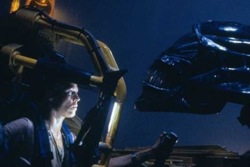
The themes of nature and motherhood throughout Aliens are very pronounced with Ripley on the one hand being situated as the ‘good’ mother/force of nature while the alien queen is situated as a ‘bad’ mother/force of nature. Ripley is presented as caring, nurturing and protective towards the orphaned Newt while the alien queen symbolises nature at its most destructive and a nightmarish version of birth where unwitting subjects are forcibly penetrated and then made to carry an alien infant, which is ‘born’ by bursting out of their chest.
While there was little backstory given to Ripley in the original Alien film, in Aliens we learn that she was coming home to a daughter (no mention is ever made of a father) who has since grown old and died during the time Ripley was in her extended period of hypersleep. When Ripley discovers this news, and is naturally upset, she is sitting in a room with an artificial projection of a forest, which demonstrates just how far removed from Earth and the natural world she is, despite being on an orbiting space station. And yet Ripley is aligned with nature both as her role as motherly protector for Newt later in the film and the very dramatic graphic match edit at the start of the film where the Ripley’s sleeping face fades into a shot of the Earth.
Hyper masculinity and technology
By including the information about Ripley having been a mother she is given a specific motherly femininity that was not necessarily present in the original Alien. This is necessary to then contrast her with the marines whom she travels with to the LV-426 colony. The marines all have hyper-masculine bodies, including the women marines, one of which is joked about for being mistaken for a man. The marines are physically in peak condition but their ultra toned and toughened bodies give them an almost manufactured appearance. They have been mentally and physically conditioned for the purposes of combat and are far removed from the intuitive and empathetic Ripley.
While treated as somewhat of a novelty the marines are not bothered by the presence of Bishop (Lance Henriksen), an ‘artificial person’, perhaps because they are just as programmed as he is, possibly more so. The dialogue spoken by the marines is also an almost nonsensical combination of military jargon, bravado and slang. It is not until after the devastating initial attack by the aliens that the traditional chains of command break down, Ripley unofficially becomes their leader, and the marines all start talking more normally as well as displacing more emotions.
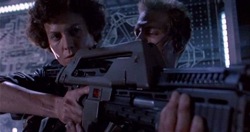
Before arriving on LV-426 everything about the marines and the settings they inhabit is artificial, aggressive and militaristic. The actual ship they travel in, the Sulaco, looks like a giant gun floating through space and while the awakening from hypersleep sequence mimics the sequence from Alien, this time, as the camera floats through the empty spaces of the ship, it, by contrast, focuses on the weaponry and other pieces of military hardware. When checking their weapons Private Drake (Mark Rolston) and Private Vasquez (Jenette Goldstein) move as if they are in some sort of dance with the heavy machinery. Private Hudson’s (Bill Paxton) boast about the marines ends with him almost in an ecstatic rapture as he lists all the weapons at their disposal. Even when the film hints at the possibility of a romance between Ripley and Corporal Hicks (Michael Biehn), it is done through Hicks offering Ripley a tracking device (completed with a joke about it not symbolising an engagement ring) and then demonstrating the use of one of his guns.
The artificial, technological and manufactured world of the military in Aliens initially excludes Ripley because of her status as an outsider. There is an anti-intellectualism in the way the marines reject her as an expert since all they think they need to know is what to point and shoot at. However, Ripley’s first act of endearing herself to the soldiers is when she demonstrates her proficiency in one of the giant robot-like cargo-loader units. By effectively giving herself an artificial giant mechanical body, Ripley is now one of the warriors who can use technology to improve upon nature. At the climatic final showdown at the end of the film it is the use of the cargo-loader that allows Ripley to defeat the queen alien. The mechanical body defeats the natural abomination. Curiously director James Cameron would later significantly alter the mechanical body symbolism when it is used in Avatar to again represent the military but this time as a destructive force that is threatening the natural world.
While Ripley does successfully use technology, machinery and weaponry to defeat the aliens she does so in an inventive and resourceful way that distinguishes her from the militarised approach of the marines. Firstly, for all their bravado, the marines in Aliens are very quickly shown to be completely out of their depth. Their weapons are useless underneath the cooling towers and they quickly discover that they are facing an enemy that does not abide by the rules of war that they are accustomed to. The aliens are the ultimate guerrilla warriors who use stealth and surprise in their attacks, discriminating against nobody. The aliens kill and impregnate the humans regardless of gender, age, class and race. After the first confrontation with the aliens most of the marines are killed (or possibly taken away for impregnation) and of the marine survivors only Hicks and Vasquez retain any sense of composure. Hudson falls to pieces and Lieutenant Gorman (William Hope) proves to be ineffective and out of his depth.
The bitch versus Mummy
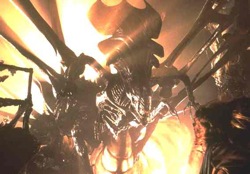 While Ripley is aligned with feminine and natural characteristics through her nurturing instincts, she is far removed from the alien creatures that represent the natural world at its most brutal and savage. The aliens are compared to both ants and bees and it turns out that the species is socially structured like an insect colony with a queen at the centre doing all the reproduction while her workers/drones go out to find bodies to be impregnated. By aligning the aliens so closely to the insect world Aliens is able to remove all audience sympathy from them as being part of the natural order. They are not a misunderstood species that only attack when provoked but are a deadly parasite that destroys other life so that it may continue. There is no doubt that the aliens must be destroyed and the charge to do so is led by Ripley, the human character most associated with nature.
While Ripley is aligned with feminine and natural characteristics through her nurturing instincts, she is far removed from the alien creatures that represent the natural world at its most brutal and savage. The aliens are compared to both ants and bees and it turns out that the species is socially structured like an insect colony with a queen at the centre doing all the reproduction while her workers/drones go out to find bodies to be impregnated. By aligning the aliens so closely to the insect world Aliens is able to remove all audience sympathy from them as being part of the natural order. They are not a misunderstood species that only attack when provoked but are a deadly parasite that destroys other life so that it may continue. There is no doubt that the aliens must be destroyed and the charge to do so is led by Ripley, the human character most associated with nature.
The only character who does speak out in defence of the aliens is Burke but his motives are purely opportunistic rather than being out of a sense of animal welfare. The Weyland-Yutani Corporation’s desire to use the aliens for their own biotech weaponry almost symbolically removes the aliens from the natural order and aligns them with the most exploitive aspects of humanity. The company may not have created the aliens but they are responsible for the events that have caused human life to be lost due to exposure to the aliens. The Weyland-Yutani Corporation employees, Burke in particular, and the aliens mirror each other as different types of ruthless parasites. Again, it is curious to note that Cameron’s approach to the natural world is remarkably different in Avatar where all the creatures are valued as sacred life, including the hostile ones. The various representations in Aliens of the natural order versus the human order are a lot less clean cut.
The ultimate portrayal of the brutal natural world in Aliens is the perverse process in which the aliens give birth via human bodies. Humans are first exposed against their will to the eggs that contain the facehugger creatures that forcibly penetrate its victim orally. The aggressive sexual penetration symbolism is even more aggressive and violent when the queen alien impales Bishop on her tail at the end of the film. Once impregnated the alien embryo grows within the human body until it is ready to rip its way out through the chest cavity, killing its victim. Even Newt recognises the similarities between human and alien pregnancies with the later being a nightmarish parody of the former.
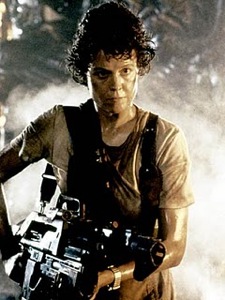 The alien queen is the monstrous mother figure as opposed to Ripley’s nurturing mothering figure. Gigantic and grotesques the alien queen is the most spectacular creature to be seen at this point in the film series, laying the deadly eggs via a giant birthing tube while her worker/drone aliens wait in attention on the side. The alien queen does also seem to possess an intelligence that the other aliens do not – she recognises the threat Ripley poses so keeps the other aliens at bay, she is able to work out how the elevator works and she is able to get on board the second dropship. Her intelligence suggests a more calculated level of menace that had not be seen previously. The initial standoff between the alien queen and Ripley is one of strange mutual recognition not just of the power each other has to destroy the other but also the motherly role they have each adopted for their own species. However, while Ripley comes up out the film being called ‘Mummy’ by Newt, the queen mother becomes the ‘bitch’ who is thrown out into space by Ripley with the aid of the cargo-loading suit. The pure harshness of the animal world as expressed in the insect nature of the alien is defeated by the nurturing mother who masters technology and machinery to defend herself.
The alien queen is the monstrous mother figure as opposed to Ripley’s nurturing mothering figure. Gigantic and grotesques the alien queen is the most spectacular creature to be seen at this point in the film series, laying the deadly eggs via a giant birthing tube while her worker/drone aliens wait in attention on the side. The alien queen does also seem to possess an intelligence that the other aliens do not – she recognises the threat Ripley poses so keeps the other aliens at bay, she is able to work out how the elevator works and she is able to get on board the second dropship. Her intelligence suggests a more calculated level of menace that had not be seen previously. The initial standoff between the alien queen and Ripley is one of strange mutual recognition not just of the power each other has to destroy the other but also the motherly role they have each adopted for their own species. However, while Ripley comes up out the film being called ‘Mummy’ by Newt, the queen mother becomes the ‘bitch’ who is thrown out into space by Ripley with the aid of the cargo-loading suit. The pure harshness of the animal world as expressed in the insect nature of the alien is defeated by the nurturing mother who masters technology and machinery to defend herself.
Over twenty years after making Aliens, James Cameron uses the nature/female versus technology/male dichotomy in Avatar to make a clear statement of support on the side of the nature/female versus technology/male dichotomy that is so prevalent in so much popular culture, past and present. Even in Terminator 2: Judgment Day (1991) Cameron has Sarah Connor (Linda Hamilton) give a speech about women creating life while men create machines of destruction. However, back in 1986 in Aliens, perhaps particularly due to the mythology Cameron inherited from Ridley Scott’s original Alien film, the traditional alignment of female characters with nature facilitates the positive representation of femininity as resourceful and nurturing but also the much more negative representation of femininity as destructive and monstrous. However, rather than concluding that Aliens is therefore a confused text in terms of gender representations we should instead see it as a complex text that both reflects cultural anxieties about femininity and promotes progressive attitudes towards femininity. After all, the mother is the one who ends up defeating the bitch.
[i] For a full discussion on the monstrous feminine in the Alien films refer to Barbara Creed, ‘Horror and the Archaic Mother: Alien’, The Monstrous-Feminine: Film, Feminism and Psychoanalysis, Routledge, London and New York, 1993.
Originally published in issue 59 (Spring 2010) of Screen Education.

